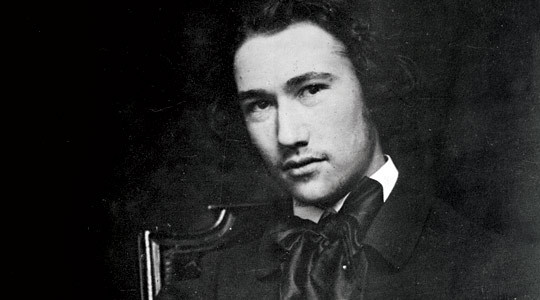
Wednesday
I’ve finally figured out a literary parallel that has been tugging at my mind for the past few weeks as Donald Trump plays a double game regarding the pandemic. The president is behaving like Michel, the narrator in André Gide’s scandalous 1902 novel The Immoralist.
On the one hand, the president has been pointing to the Coronavirus Task Force guidelines and telling governors it’s up to them to handle the pandemic. On the other, he has been undercutting the governors and encouraging weapons-toting protestors (“very good people”) to “Liberate Michigan” (and Virginia and Minnesota) from these very guidelines. Because of Trump’s wretched leadership, wearing a mask has itself become a provocation in some areas so that there’s been at least one murder, numerous tirades (in which potentially infectious droplets travel wild and free), and various governors deciding that requiring masks is “a bridge too far.” As a result, the serious governors are being attacked while the others have all but surrendered, opting instead for Trumpian magical thinking. The consequences we face are beyond imagining.
Immoralist is the first-person account of a narcissist who, after a bout with near-fatal tuberculosis on his honeymoon, discovers a passion for young boys. While Michel never acts on this passion, his fascination with the forbidden clashes with his responsibilities as married man and farm owner. Increasingly he becomes more interested in the secret lives of the peasants on his farm than he does in his marriage.
The Trumpian moment occurs when, intrigued by a poacher he catches—the younger son of his estate manager–he joins him in setting secret traps on his own land! Basically, he is a respectable landowner and married man by day and a secret thief by night.
From that moment I no longer cared for going out in the day, when there was so little to attract me in the emptied woods. I even tried to work — melancholy, purposeless work, for I had resigned my temporary lectureship — thankless, dreary work, from which I would be suddenly distracted by the slightest song, the slightest sound coming from the country outside; in every passing cry I heard an invitation. How often I have leapt from my reading and run to the window to see — nothing pass by! How often I have hurried out of doors. . . . The only attention I found possible was that of my five senses.
But when night fell — and it was the season now when night falls early — that was our hour. I had never before guessed its beauty; and I stole out of doors as a thief steals in. I had trained my eyes to be like a night-bird’s. I wondered to see the grass taller and more easily stirred, the trees denser. The dark gave everything fresh dimensions, made the ground look distant, lent every surface the quality of depth. The smoothest path looked dangerous. Everywhere one felt the awakening of creatures that lead a life of darkness.
Eventually, the older son of his manager catches him at it and calls him out:
“Take care, Charles, you’re going too far. …”
“Oh, all right! You’re the master — you can do as you please.”
“Charles, you know perfectly well I’ve made a fool of no one, and if I do as I please, it’s because it does no one any harm but myself.”
He shrugged his shoulders slightly.
“How can one defend your interests when you attack them yourself? You can’t protect both the keeper and the poacher at the same time.”
“Why not?”
“Because . . . Oh, you’re a bit too clever for me, Sir. I just don’t like to see my master joining up with rogues and undoing the work that other people do for him.”
Unfortunately, in our case people get sick when Trump joins up with rogues.
Scholar Louis A. MacKenzie has noted that the “scandal” of Gide’s novel is how it lures the reader into sympathizing with a narcissist’s vision of the world:
One could in fact assert that the “scandal” of L’Immoraliste resides specifically in the friction between a tale of arrogance, ego-centrism, dissipation, and decadence and a style that tends to thwart the rush to judgment by cloaking such unsavory traits and actions in language that is as refined as it is clever.
I can’t say that I was won over by the narrator when I read Immoralist as a French minor at Carleton College fifty years ago. In fact, he left me cold. But then, even at 20 I was someone who believes in responsible leadership, whether of a farm or a country. I will choose a colorless but competent technocrat like Hillary Clinton over a perpetual adolescent like Trump any day.
Why some people are thrilled by an outlaw president who flirts with the dark side baffles me. I just pray that they’ll come around to Charles’s view, as expressed in his final words to Michel:
You taught me last year, Sir, that one has duties to one’s possessions. One ought to take one’s duties seriously and not play with them … or else one doesn’t deserve to have possessions.

